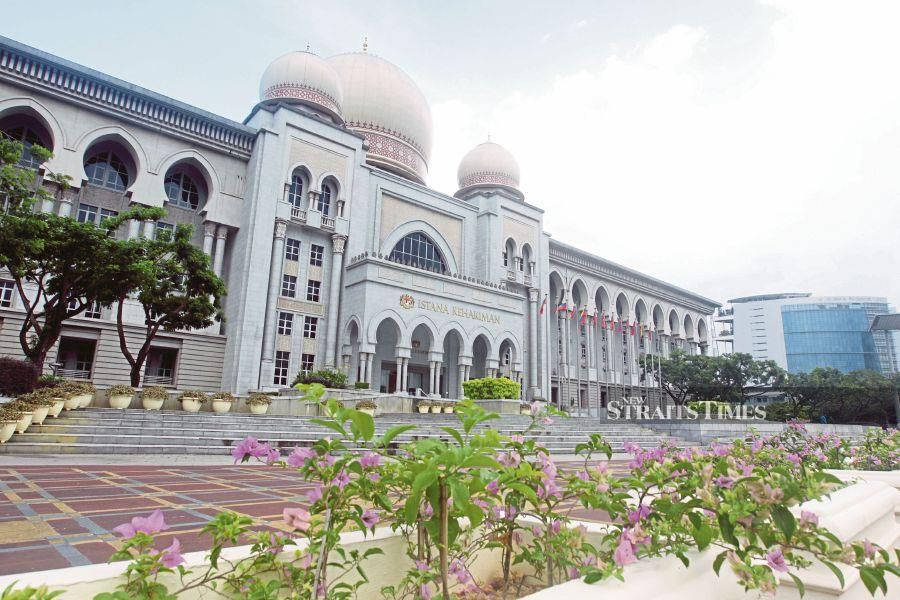
A FORMER colleague (retired law lecturer) posed a surprising question recently: "Is it time for us to have a Constitutional Court?" I shot back: "Why raise this question now?"
In reply, he told me about Opposition leader's most recent action in posing several tough constitutional issues to the Federal Court.
Then he reminded me about the Rosliza Ibrahim's case decided by a full bench of nine judges of the Federal Court. He added that the court usually sat with five judges, and in really tough cases, the number went up to seven. A full bench of nine judges is unusual and exceptional.
My colleague said that the Federal Court should be left to devote its expertise, energy and time to its crucial role as the ultimate appellate court in the country, not a court of first instance hearing complex constitutional issues.
It is because of this heavy load (to hear constitutional cases) that the Federal Court has little time left to devote to appellate work. There have been cases where appeals from Court of Appeal to the Federal Court that should have been allowed were unfortunately denied leave to appeal.
As a result, our litigants actually have one automatic right of appeal, from the High Court to the Court of Appeal. Beyond that, very much depends on the lawyer's ability to persuade the Federal Court to open its doors to his client. If this very heavy load can be taken away, the Federal Court would have more time to be a meaningful final appellate court in the country.
When I asked my colleague whether he had read a seminal work on the subject by Professor Andrew Harding, he replied: "Of course, I did." However, he added that no single person (despite his towering standing) should be allowed to determine how we shape the future of our judicial institutions.
Harding had said in his article that there was no need for Malaysia to have a constitutional court. He added that there were two reasons why "some people think" a Constitutional Court "would be good for Malaysia". In his opinion, "both of these reasons are unfounded". (See "A constitutional court for Malaysia: A misconceived legal transplant?" on https://theasiadialogue.com)
In January 2019, then minister in the Prime Minisiter's Department Datuk Liew Vui Keong admitted that there was a proposal to set up a Constitutional Court to handle constitutional issues. However, he believed the Federal Court could adequately do the job.
Last Feb 8, Anwar Ibrahim had filed an application to refer several questions to the Federal Court pertaining to his Jan 25 judicial review application over the government's decision to advise the king to declare an emergency proclamation.
In that earlier application, Anwar had sought leave to file a judicial review to seek a declaration from the Federal Court that Prime Minister Tan Sri Muhyiddin Yassin's advice to the Yang di-Pertuan Agong for an emergency proclamation was unconstitutional and unlawful.
Anwar told reporters then that "the application is not challenging the emergency proclamation, but only the prime minister's decision to advise the king to approve the emergency ordinance". According to a Bernama report, the constitutional issues referred by Anwar to the Federal Court are as follows:
1. Whether the decision to give advice to the king to suspend Parliament is subject to the ouster clauses in Article 150 of the Federal Constitution;
2. Whether the decision to give the advice to the king to suspend Parliament is reviewable by the courts;
3. Whether section 39(2) of the Malaysia Act 1963, section 15(d) of the Constitutional (Amendment) Act 1981, Article 150 (6) and (8) of the Federal Constitution are inconsistent and/or in contravention of Articles 4, 5, 8 and 121(1) of the Federal Constitution; and
4. Whether the inherent jurisdiction of the courts, including the powers of review in relation to procedure, can be completely inhibited/ousted, by the Legislature.
In view of the urgency of the matter, Anwar's lawyer had also filed a certificate of urgency for the matter to be heard by the Federal Court as soon as possible. Now we wait.
The easiest thing for us to do is to do nothing, and let the status quo remain — "If it ain't broke, don't fix it". Or should we plan for the future and do the right thing?
The writer, a former federal counsel at the Attorney-General's Chambers, is deputy chairman of the Kuala Lumpur Foundation to Criminalise War
-NST



No comments:
Post a Comment
Note: Only a member of this blog may post a comment.